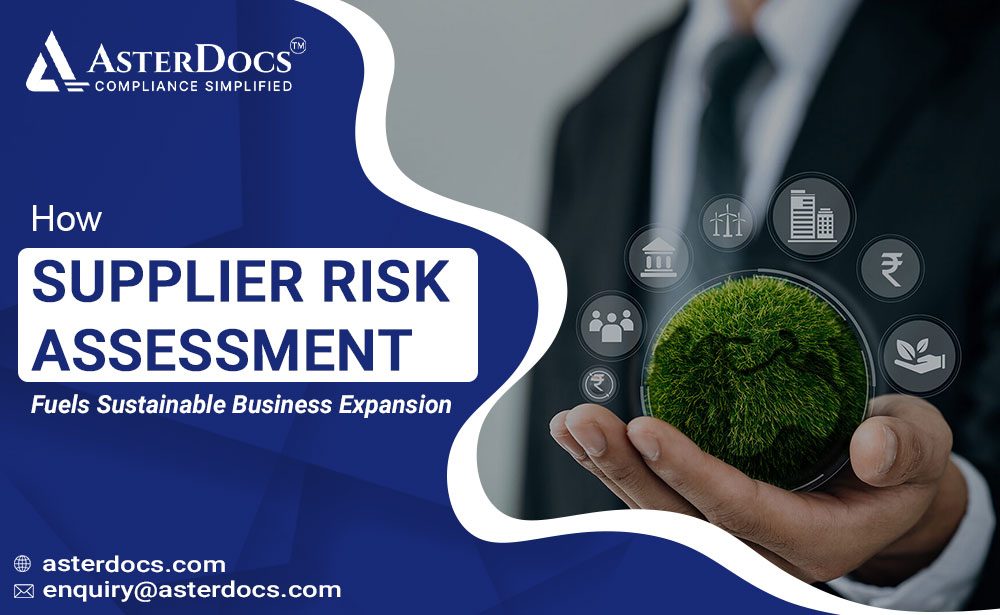The connection between supplier risk assessment and sustainable business growth is undeniable in today’s complex business landscape. As companies expand their global footprint and engage with a diverse network of suppliers, the risks associated with these partnerships become increasingly pronounced. This is where the critical role of supplier risk assessment comes into play, ensuring that businesses not only mitigate potential risks but also pave the way for long-term, sustainable growth.
Understanding Supplier Risk Assessment
Supplier risk analysis systematically evaluates potential risks associated with engaging specific vendors or suppliers. It goes beyond the surface and delves into the intricacies of supplier relationships, evaluating factors such as financial stability, regulatory compliance, cybersecurity practices, and operational resilience. This process provides businesses with valuable insights into the vulnerabilities within their supply chain, helping them make informed decisions and implement effective risk mitigation strategies.
The Growing Importance of Supplier Risk Assessment
In a rapidly changing business landscape, the importance of supplier risk evaluation has amplified significantly. The interconnectivity of global supply chains, coupled with factors like regulatory changes, economic uncertainties, and geopolitical issues, has elevated the need for a comprehensive risk assessment approach. Vendor security and supply chain risk assessments are no longer just buzzwords; they are strategic imperatives for businesses looking to ensure sustainable growth.
Supplier Risk Assessment as a Driver of Sustainability
- Risk Mitigation for Business Continuity: Supplier risk evaluation is a proactive measure to safeguard business continuity. By identifying and addressing potential risks, companies can prevent disruptions that could otherwise lead to production halts or delivery delays. This reliability enhances customer satisfaction and maintains revenue streams, contributing to long-term growth.
- Protection of Reputation: A tarnished reputation can severely affect any business. Engaging with suppliers with questionable practices or non-compliance history can negatively impact a company’s image. Supplier risk analysis helps companies choose partners with ethical and responsible business practices, safeguarding their reputation and maintaining stakeholder trust.
- Informed Decision-Making: In business, knowledge is power. Supplier risk assessment provides businesses with data-driven insights that guide informed decision-making. Companies can make strategic choices that support sustainable growth and minimize setbacks by assessing risks and understanding potential vulnerabilities.
- Regulatory Compliance and Avoidance of Penalties: Non-compliance with industry regulations can result in hefty fines and legal complications. Supplier risk assessment ensures that vendors adhere to regulatory standards, reducing the risk of compliance-related issues. Avoiding penalties allows companies to allocate resources toward growth initiatives rather than legal battles.
- Operational Efficiency and Cost Reduction: Effective supplier risk evaluation streamlines the procurement process by identifying high-performing and reliable suppliers. This efficiency minimizes the need for constant supplier switches and negotiations, reducing operational costs and supporting a more sustainable bottom line.
Strategies for Successful Supplier Risk Evaluation
- Comprehensive Data Collection: Effective supplier risk analysis requires a holistic view of a supplier’s profile. Collecting comprehensive data, including financial reports, compliance records, and cybersecurity practices, provides a well-rounded understanding of potential risks.
- Quantitative and Qualitative Analysis: A balanced risk assessment approach involves quantitative and qualitative analysis. While quantitative data provides measurable insights, qualitative analysis considers factors that might not be quantifiable but are equally crucial for risk evaluation.
- Collaboration and Transparency: Open communication with suppliers is key. Engage in transparent discussions about risk assessment procedures and encourage suppliers to share information. This collaborative approach fosters strong relationships and a mutual commitment to risk mitigation.
- Continuous Monitoring and Review: Supplier risk assessment is not a one-time endeavor. Risks evolve, and suppliers’ situations change. Regularly monitor and review risk assessments to ensure they remain accurate and up-to-date.
Embracing Sustainable Growth through Supplier Risk Assessment
Supplier risk evaluation stands as a linchpin in the pursuit of sustainable growth. By identifying and mitigating potential risks within the supply chain, businesses create a solid foundation for steady expansion. Vendor security and supply chain risk assessments are not just measures to avoid pitfalls; they are strategic enablers of long-term success. As the business landscape evolves, companies prioritizing supplier risk assessment will be better equipped to navigate uncertainties and thrive in an increasingly competitive environment.
In conclusion
The symbiotic relationship between supplier risk assessment and sustainable business growth is undeniable. With the right strategies and tools in place, companies can harness the power of supplier risk assessment solutions to make informed decisions, protect their reputation, ensure compliance, and drive operational efficiency. In doing so, they create a pathway toward growth and enduring success in the dynamic and ever-evolving world of business.













